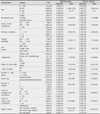Abstract
Purpose
The purposes of this study were to understand correlation of parenting stress and turnover intention of nurses, and to provide basic data for effective nursing management.
Methods
Subjects included 287 nurses who had children and worked in hospitals. Data were collected through organized questionnaires from September 1st to 30th 2010. Collected data was analyzed with descriptive statistics, t-test, ANOVA, correlation analysis using PASW statistics 18 program.
Results
The average score for parenting stress of the participants was 3.12 out of 5. Nurture stress was statistically different depending on age, job position, shift work, night duty and stages of family development. The average score for turnover intention of the participants was 3.34 out of 5. Turnover intention was statistically different depending on age, number of children and stages of family development. As a result of correlation analysis of parenting stress and turnover intention, turnover intention showed positive correlation with daily stress, stress caused from taking parent role and average parenting stress.
References
1. Bong HJ. The parenting stress and it's related variables of employed nurses. 2008. Dae Jeon: Chungnam National University;Unpublished master's thesis.
2. Brief AP. Turnover among hospital nurse: a suggested model. J Nurs Assoc. 1976. 6(8):50–58.
3. Cha SS. Parenting stress of employed mothers with young children. 2005. Seoul: Catholic University;Unpublished master's thesis.
4. Choi SO. Study on the child care center demand among married nurses. 1993. Seoul: Hanyang University;Unpublished master's thesis.
5. Crnic KA, Greenberg MT. Minor parenting stresses with young children. Child Dev. 1990. 61:1628–1637.

6. Duvall . Marriage and family development. 1997. Lippincott.
7. Goo J. A study on the married women's desire in the company day care. 2002. Busan: Dong-A University;Unpublished master's thesis.
8. Han KH. A Study on the Improvement of in-Company nursing facilities. 1997. Seoul: Hanyang University;Unpublished master's thesis.
9. Jones CB. Calculating and updating nursing turnover costs. Nurs Econ. 1992. 10(1):39–45.
10. Jung JY. The effect of employed mothers' parenting stress, self-perception, and social support on their depression. 2008. Seoul: Yonsei University;Unpublished master's thesis.
11. Kwon KO. Study on using child care service and demand of hospital nurses in 3-shifts. 2005. Busan: Inje University;Unpublished master's thesis.
12. Kwon YS. Parenting stress and job and family related variables of employed nurses. 2006. Seoul: Hanyang University;Unpublished master's thesis.
13. Kim KH, Kang HK. Development of parenting stress scale. J Korean Home Econ Assoc. 1997. 35(5):141–150.
14. Kim MS. Effects of parenting stress and parenting efficacy on parenting behavior among mothers: the case of those with preschoolers and school-aged children. 2005. Seoul: Catholic University;Unpublished master's thesis.
15. Kim YS. Nurse's parenting stress and parenting efficacy. 2010. Gangneung: Kwandong University;Unpublished master's thesis.
16. Kim Y, Jung H, Lee S. Life in general adult psychiatric symptoms of stress and its impact on the body. J Korean Neuropsychiatr Assoc. 1989. 28(2):282–291.
17. Kim CJ, Park J. Turnover of nurses in the study of factors associated with decision. J Nurs Acad Soc. 1991. 21(3):383–395.
18. Kim HH. Affecting factors to parenting stress of nurses. 2007. Jeju: Tamna University;Unpublished master's thesis.
19. Kim HJ. A comparative study on the job satisfaction and intentions of quitting a job of nurses of small and medium sized clinics and university hospitals. 2002. Seoul: Kyung Hee University;Unpublished master's thesis.
20. Min M. A study on child care among working women and their demand regarding workplace child care facilities. 2008. Gumi: Kyungwoon University;Unpublished master's thesis.
21. Min HY. The study on employed housewives' upbringing situation and their demands on nursing facilities in work place- The participants are employed housewives who work in third general hospitals-. 2003. Seoul: Sogang University;Unpublished master's thesis.
22. Min HR. Relationship between married nurese' maternal role conflicts and attempt of turnover. 2005. Chuncheon: Hallym University;Unpublished master's thesis.
23. Park B. A study on the parenting stress of working mothers with infants. 2006. Gwangju: Chosun University;Unpublished master's thesis.
24. Park HS. Relationship between perceived nursing care role orientation, job characteristics, and turnover among nurses. 2002. Seoul: Yonsei University;Unpublished master's thesis.
25. Piao YF. The relationship between job characteristics and organizational commitment and turnover intention in hospital nurses. 2006. Seoul: Seoul National University;Unpublished master's thesis.
26. Seong JS. A study on married nurses' maternal role conflicts and their factors. 2001. Seoul: Hanyang University;Unpublished master's thesis.
27. Yoon G. Factors affecting the turnover intention of Nurses. 2010. Daejeon: Eulji University;Unpublished master's thesis.
28. Youn M. The attempt of turnover by a general hospital nurses and its related factors. 2001. Gwangju: Chosun University;Unpublished master's thesis.
29. Pyun E. The mother's role of recognition and the parenting stress of working mothers having children from infants to preschoolers. 2003. Seoul: Ewha Womans University;Unpublished master's thesis.




 PDF
PDF ePub
ePub Citation
Citation Print
Print





 XML Download
XML Download